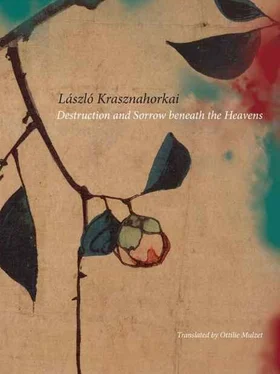The theatre is situated among bare, prefabricated housing estates with cracked facades in a remote, hidden street which the local taxi driver can barely find — kunqu theatre? he asks, irritated, twisting the map in his lap; they are almost late because it is so hard for him to find the spot, and finally, after much meandering and an exorbitant fee, he discharges the two foreigners at the requested location. They are in a cul-de-sac, of course if this little stretch of road leading to the front entrance in the middle of a soulless housing estate could even qualify as such, and if a cul-de-sac can be something that leads inward, but behind the ugly concrete building of the theatre some kind of abandoned electric works or transformer essentially closes off the road and does not permit any further passage.
The deputy director of the kunqu theatre is a skinny person of average height, wearing — even today — the uniform of impoverished public servants, a dark-blue suit, shabby, worn through at the elbows and the knees, a crumpled white shirt, a knotted tie; a smouldering cigarette is eternally in his hand. He smiles, and offers tea to his visitors in the rundown office in which there is only a ramshackle table and a few chairs. The walls are grimy, hardly any light comes in; a thick set of bars closes in on a tiny window. They listen closely, but from the outside, from the building, nothing can be heard, from either the floor or the corridors — something, anything, a bit of noise, human speech, a shout, something that would confirm that they are not here alone.
But — they are alone, says the deputy director smilingly. Just at this moment — he clears his throat, embarrassed — there are no rehearsals. Maybe later on there will be some. Maybe? — Stein looks at him questioningly. He just smiles, listens to the introductory words of the interpreter, why they are here, what they are looking for, how they happened to find him, what they wish to accomplish with this conversation, that is, they would like to know if it is possible that — in this era of the final dying gasps of Chinese classical culture — the kunqu theatre, as a forgotten, neglected genre, might have preserved something from this culture precisely because it is forgotten and neglected; perhaps — through its methodology or its special means of conveying tradition — perhaps hidden away, concealed in some minuscule fact — is the whole. . Because an era, says Stein, or if you will, a succession of eras, can eliminate the kunqu theatre from the face of the earth, can annihilate the kunqu texts, can expel or retrain the kunqu actors and musicians, but maybe what it can’t do is to beat the knowledge out of the master’s head, knowledge which — if he can survive the difficult times — he can transmit to his disciples. The deputy director nods, he understands, but he does not say anything for a long time. He pours the tea, and then he pours it again. He is preparing not for a dialogue but for a performance. He clears his throat again, and begins to speak.
lai guoliang. The kunqu is not only the oldest kind of Chinese theatre but is also, next to Greek tragedy and the Sanskrit drama, one of the three most ancient theatrical forms. The Greek and Sanskrit theatres have not existed now for over 2,000 years but the kunqu has, and so it is one of the sources through which the Chinese spirit has been preserved and safeguarded. We refer to it as ancient, and we consider it one of the fundamental forms of archaic theatre, although what we know and practice today is a variation in continuous development from an ancient original, directly created during the Ming era by Wei Liangfu[85] in Kunshan, to the north-east of Suzhou. The connection between the novels of the Ming and Qing eras and kunqu is extraordinarily close. You could even say that the classical Chinese novel came about through kunqu. For example, Mudan Ting (‘The Peony Arbour’)[86] by Tang Xiandu,[87] Chang Sheng Dian (‘The Palace of Eternal Life’)[88] by Hong Sheng[89] or Feng Zheng Wu (‘The Kite’s Mistake’)[90] by Li Yu,[91] well, these famous kunqu plays are all part of classical Chinese culture. We must always approach kunqu through the classical Chinese novel, through classical Chinese literature, because kunqu itself represents the most exquisite classical literature.
They look at his crumpled dark-blue suit, they listen to this skinny individual and they sense a kind of elation behind his words, a kind of mirth for all his seeming broken down. They can see that he would very much like to continue talking, to say more about what he started, but they need to try and bring him back to the concrete question, so they repeat that almost nothing has been able to remain today from all that was classical culture. And yet here is a kunqu theatre. Kunqu was a part of classical erudition. How is it possible that it survived?
lai. I’m not sure that it has! In any event, in terms of the preservation of the genre or, rather, its resurrection, it is precisely this theatre of ours, right here, which always played a very important role. We are the Kunqu Company of Zhejiang Province. And this place, where you are now sitting, is the director’s office. Well, the deputy director’s, because we have no director right now, just a deputy director, and that’s me. Well, so, you understand now. In 1956, the Zhejiang Provincial Society performed a traditional piece in Beijing, the title of which was Shiwu Guan (‘Fifteen Strings of Copper Coins’).[92] After the founding of the People’s Republic of China, this was a tremendous event from the viewpoint of kunqu — because the entire country took notice of this performance of ours in Beijing. Zhou Enlai[93] convened a special conference to debate the success of this performance. Zhou Enlai! And then an article appeared about it in Renmin Ribao .[94] Our society became the first state Kunqu Company. Honour was restored to kunqu.
Stein senses that the conversation is beginning to meander away from a promising path, so as a way of trying to get back to the subject of the ways of transmission of tradition, he recalls Lai’s words: that kunqu is a very ancient genre. It cannot be taught just like that but must be transmitted in a special way. How does the instruction of kunqu take place?
lai. Kunqu is passed on from generation to generation, as you very correctly noted. In the 50s, the greatest master, Chan Zibei, was still alive. All his students performed in our society. That is why the Kunqu Company of Zhejiang Province was the most renowned. The performance of Shiwu Guan and the pieces that followed were all filmed. Our activities were very highly valued.
But how did the instruction take place? How did Chan Zibei teach?
lai. In the ancient manner of transmission of tradition. Like artisans, or Chinese doctors. Look at traditional Chinese medicine. How does that work? There are medical prescriptions, or acupuncture. Your head is hurting but the needle is stuck into your leg. How do they know? There is no interconnected theory, as in Western medical science, but the accumulation of experiences which leads to an interconnection of practice. It is not possible to master Chinese medicine at a university. A master is needed, a master who knows. And this master transmits his knowledge to his students through practice, who then become masters and continue in the same way. Kunqu too can only be taught this way. A master is needed. He is the one who shows, rehearses, practices, enacts; and at the beginning, the students do nothing but imitate the master. They don’t ask any questions, they don’t read books, they don’t go to kunqu school, they don’t write papers on the theory of kunqu nor take exams in it, they only watch and imitate. After many years, their individual styles begin to emerge. The modes of performance change, of course: these change with the era, the circumstances of life, peoples’ sensibilities towards the beautiful and with the material at hand. All these changes are reflected in the history of kunqu. In the instruments of its expression. But I must say that kunqu does adhere to tradition very strictly, to the texts of the written plays, to the continuity of characteristics manifest in those works, and if the individual eras have always — as they continue to do — left their stamp upon the genre, there still remains that which never changes and never can change — the kunqu concept of space and time. Western theatrical performance is very highly respected here, but bear this in mind from your perspective. Think of Shakespeare. The action is taking place in a castle, so on the stage a castle is built. And this creates a definite idea of time and space in the mind of the spectator. But this limits the actor — in our tradition. In Chinese theatre, in particular on the kunqu stage, you won’t see any castles. The kunqu actor has to create it by his own means. He uses every instrument, every skill, every movement, every modulation of voice at his command, and the public experiences and understands that the action is, at that moment, taking place in a castle. The actor creates time and space. This is the foundation of kunqu and all Chinese theatre. We call it xuni, ‘empty mimicry’. And kunqu is the only tradition which has preserved this ancient essence. It has preserved the colours of the costumes, the regulation of the movements, the order of the gestures of expression, the symbolism of the face painting. . Let us take face painting. Why did it develop like this? And why did it develop at all? I am not a professor of kunqu, I am just a deputy director at the Kunqu Company of Zhejiang Province, but I have thought a lot about this while taking care of the theatre’s affairs. I am in charge of the lighting at our performances. And maybe it is precisely because of that — I know something about lighting — that I came to the following conclusion. In the old days, across the many centuries of kunqu, there were no spotlights. There were only flaming torches, and the performances took place by torchlight. The light of the spotlight makes it possible to see the tiniest quiver on the face of an actor. This is not possible by the light of a torch. The tradition of kunqu also took into account that, in our civilization, people always attribute definite meanings to certain colours. Look at red. Red is the colour of honour, of smouldering feelings, of passion. White is the colour of intrigue and unscrupulousness. When the kunqu actor stepped onto the stage, people immediately knew from his make-up that this was a good person, this was an evil person. This was visible by the light of the torch. Now we use spotlights but we remain loyal to our face painting. The spotlight does not change anything of the essence. Nor does it change anything about kunqu. Nor does it alter anything in the meaning of the make-up. If it changed it in any way, then we would still be performing by torchlight. .!
Читать дальше












